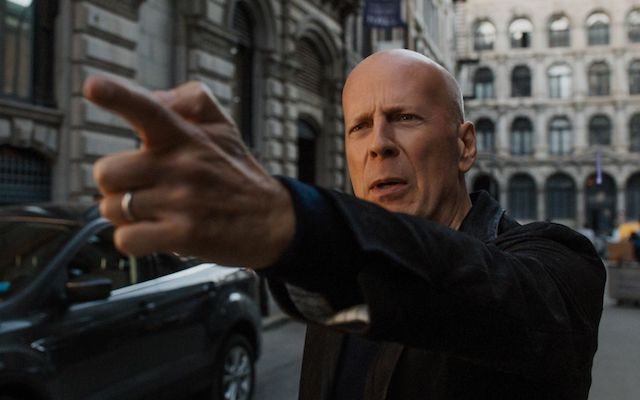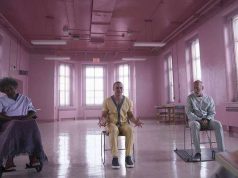
The way the “Death Wish” remake starts, you think it’s going to be exactly what you feared/hoped it would be. We’re in Chicago (not New York this time), hearing a flurry of news reports about gun violence while a police car containing a gunshot cop screams through the crime-ridden city on its way to the hospital. The cop dies, unfortunately, and the doctor who was unable to save him must then go to the room next door to save the life of the shooter. The surviving police officer finds this grossly unfair.
Chicago? Rampant gun violence? Cops shot by thugs? Indignation over criminals’ lives being valued? This is going to be a right-wing fever dream promoting firearms and vigilantism, isn’t it? A lot of the vigilante’s criminal targets are going to be minorities, aren’t they? This is going to be a tone-deaf, borderline offensive mess!
Alas, it is not to be. The movie isn’t good (make no mistake), but neither is it an outrageous propaganda tool like its 1974 predecessor. (Technically, this isn’t a remake but a new adaptation of Brian Garfield’s novel, though it seems to take at least as many liberties with the book as the Charles Bronson version did.) As usual, director Eli Roth (“Hostel,” “Cabin Fever”) and screenwriter Joe Carnahan (“The Grey,” “The A-Team”) are focused on violence and revenge, with little interest in exploring the sociopolitical subtext one way or the other.
“Great!” you say. “Who wants politics in their shoot-’em-ups anyway?” But the decision to set a film in Chicago and have it be all about crime and gun violence, but then NOT get into the issues those subjects bring up, is a statement of its own. Choosing not to address hot-button topics IS a political choice.
To be sure, going all the way with the politics would have been reckless and controversial, neither of which necessarily means “better.” But I bet the movie would have been more interesting. As it stands, it’s a dragged-out slog, easily 20 minutes too long, with a protagonist whose motives are understandable but who never becomes a fully developed character.
He is Bruce Willis, though, so he has that going for him. Our smirky friend has been slumming it lately, starring in straight-to-video trash with titles like “Acts of Violence” and “First Kill,” but “Death Wish” (OK, the title fits the trend) puts him back on the big screen as Dr. Paul Kersey, a renowned surgeon with a loving wife, Lucy (Elisabeth Shue), and teenage daughter, Jordan (Camila Morrone), who’s going off to college soon. A near-fight with a loudmouth at a youth soccer game establishes Paul’s preference for words over fists, though his brother, Frank (Vincent D’Onofrio), regales Lucy and Jordan with stories of how Paul used to be a scrapper, back in the day.
As expected, and soon enough that we don’t get restless, three masked men invade the Kersey home, shoot and kill Lucy, and put Jordan in a coma. (There’s no sexual assault in this version, mercifully.) Paul buries Lucy in her Texas hometown, where her father (Len Cariou) takes a moment while driving home from the funeral to pull his pickup truck over and fire a shotgun at poachers. This is what a man does. He defends what’s HIS. We love and adore and never speak ill of the police, but you can’t count on them to help you. You need a gun for that.
The scene at the gun shop where Paul first contemplates vigilantism is almost as satiric as it should have been. A perky blond clerk (Kirby Bliss Blanton) tells Paul how easy it is to get a gun, whispering conspiratorially about how no one ever fails the mandatory safety class. Instead of buying one, though, Paul opts to rely on dumb luck, which works out great: while he’s operating on a gang member in the E.R., a gun literally falls out of the patient’s sweatpants onto the floor, unseen by anyone but Paul, who kicks it under the table and collects it later.
Paul’s first taste of blood (not literally) comes when he witnesses a carjacking and opens fire on the perpetrators. Video of the incident, captured by a bystander, goes viral, but Paul’s wearing a hoodie that obscures his identity. He targets a drug dealer next, and so on. Chicago’s only homicide detectives, Raines (Dean Norris) and Jackson (Kimberly Elise), talk to Paul about their investigation into his wife’s murder, unaware that he’s the man behind the vigilante killings that they are also (half-heartedly) investigating.
He’s really after the people who hurt his family, of course, and the film contrives ways for him to find them. This, you can tell, is what gets Roth and Carnahan up in the morning: specific, painful revenge against deserving victims, with maybe a pun or two thrown in for good measure. Dr. Paul Kersey, who once swore to uphold the Hippocratic Oath, turns out to be downright gleeful when it comes to torturing and killing bad guys (who are mostly white with a smattering of other races), not to mention good at it.
I can enjoy mindless fictional violence when it doesn’t hit too close to home. “Death Wish” is mostly OK in that respect, except for a shoot-out between Paul and one of the killers in a crowded nightclub, a sequence that’s distastefully casual about innocent bystanders and public shootings. But the film’s bigger problem is its slow, meandering pace, which belongs to a movie far more contemplative than this one. This needed Roth’s grimy, fast-and-loose grindhouse sensibilities, and it needed a more efficient screenplay than the bloated one Carnahan delivered. It’s simple, really. If you’re gonna tell a story that pushes buttons, PUSH THE BUTTONS.
C (1 hr., 47 min.; )





